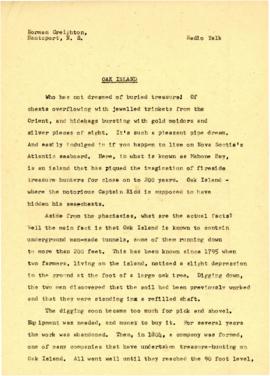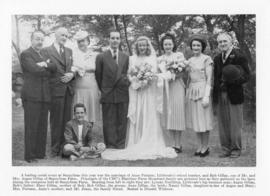Title and statement of responsibility area
Title proper
General material designation
- Graphic material
- Textual record
Parallel title
Other title information
Title statements of responsibility
Title notes
Level of description
Repository
Reference code
Edition area
Edition statement
Edition statement of responsibility
Class of material specific details area
Statement of scale (cartographic)
Statement of projection (cartographic)
Statement of coordinates (cartographic)
Statement of scale (architectural)
Issuing jurisdiction and denomination (philatelic)
Dates of creation area
Date(s)
-
Bulk, 1913-1995 (Creation)
-
1717 - 1995 (Creation)
Physical description area
Physical description
Publisher's series area
Title proper of publisher's series
Parallel titles of publisher's series
Other title information of publisher's series
Statement of responsibility relating to publisher's series
Numbering within publisher's series
Note on publisher's series
Archival description area
Name of creator
Biographical history
Norman Charles Creighton (1909–1995) was born to Charles Jolly and Harriett (nee Hendry) Creighton in Bedford, Nova Scotia. He graduated from the Maritime Business College in Halifax in 1929, where he took classes in correspondence, typing, and shorthand. He worked as private secretary until he was struck down by pulmonary tuberculosis in his early twenties. After his recovery three years later, Creighton settled in Hantsport, where he established a plant nursery and began beekeeping. He spent the majority of his adult life in Hantsport with his older sister Laleah; neither sibling married.
Creighton's writing career did not begin until 1941, when he was in his early 30s. That year he created "The Gillans," a dramatic serial about a farming family for CBC radio's Maritime version of the Farm Broadcast. The serial was highly successful, but very demanding of Creighton, who was required to write five scripts a week. He resigned in 1949 but continued to do freelance work for CBC Radio as a writer for the short-lived weekly serial "Three of a Kind," and as a writer and broadcaster of radio talks. These short talks were among Creighton's most popular works, and he created them on a regular basis for over three decades.
In the early 1950s, Creighton began writing for print. His short stories were routinely rejected from magazines, but his non-fiction articles were more successful, appearing in the Atlantic Advocate and Maclean's. Although he had several published articles, Creighton's career as a magazine writer never became anything more than flirtatious; his attentions were directed at radio and the new medium of television. In 1955, Creighton moved to New York City to take a course on television writing at Columbia University. He spent five years in New York City, but his career as a writer for the new medium never took off, and he was forced into menial office work to pay the bills.
After leaving New York City, Creighton returned to Hantsport and resumed his career as a freelance writer and broadcaster. During the 1960s he worked on special projects for CBC Radio and CBC International, which included interview shows on the town of Lunenburg and the V. E. Day riots in Halifax, and a short series of comedy shows called "The Rum Runners." In addition to his regular radio talks, Creighton also wrote radio plays, acted in several CBC Radio dramas, and penned the occasional magazine article. Creighton took on fewer projects as the 1970s progressed, but he researched and recorded radio talks until his retirement in the 1980s. Creighton was a member of the Radio Writers' Guild, the Alliance of Canadian Cinema, Television and Radio Artists (ACTRA), and a founding member of the Writers' Federation of Nova Scotia (WFNS).
Creighton was a prolific writer, but little of it has been published. In 2001, Creighton's neighbour Hilary Sircom edited Talk about the Maritimes, a compilation of Creighton's essays accompanied by paintings and poems created by his older brother Alan Creighton.
Custodial history
Scope and content
Notes area
Physical condition
Immediate source of acquisition
Arrangement
Language of material
- English
Script of material
Language and script note
Location of originals
Availability of other formats
Restrictions on access
Terms governing use, reproduction, and publication
Finding aids
Finding aid
Associated materials
For the papers of Creighton's older brother Alan Creighton, see also MS-2-701 in the Dalhousie University Archives.
Relevant materials may be found in the fonds of other members of the Creighton family, including the Wilfred (G.W.I.) Creighton fonds (MS-2-264) and the Catherine Creighton and Family fonds (MS-2-656).



